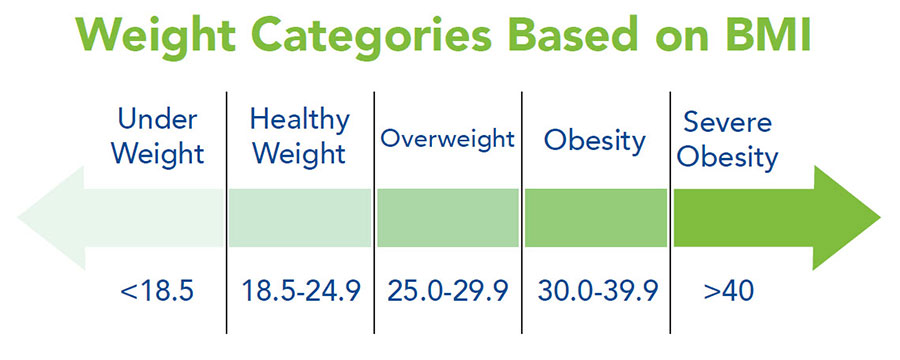Understanding Obesity
What is Obesity & Severe Obesity?
Obesity is a treatable disease that is a worldwide health concern associated with having an excess amount of body fat. It is caused by genetic and environmental factors and can be difficult to control through dieting alone. Obesity is diagnosed by a healthcare provider and is classified as having a body mass index (BMI) of 30 or greater. Nearly 40 percent of Americans have obesity.
Obesity Is
- A disease.
- A worldwide health concern.
- Caused by many factors.
- Treatable and manageable.
Obesity Is Not
- Your fault.
- Yours to manage alone.
- Just about food.
- Cured by a miracle treatment.
Body mass index (BMI)
 Body fat is hard to measure directly. So it is often measured by body mass index (BMI). BMI measures weight related to height. It is a common way to measure body fat and is one tool healthcare providers use when talking about weight.
Body fat is hard to measure directly. So it is often measured by body mass index (BMI). BMI measures weight related to height. It is a common way to measure body fat and is one tool healthcare providers use when talking about weight.
To find your BMI, please see the BMI chart on obesityaction.org (link opens in a new tab).
BMI is not a percentage of body fat. BMI is only part of a diagnosis of obesity. Ask your healthcare provider for other ways of determining obesity.
How Weight is Categorized

Overweight
Having a BMI in the overweight range (25.0 29.9) is a health concern. Excess weight is hard on your body. It can lead to other health problems including obesity. People who have a BMI in the overweight range and have other health problems (such as type 2 diabetes or heart disease) need to see their healthcare provider for treatment options.
Obesity
Obesity is a disease where a person’s weight is in an unhealthy range (BMI of 30.0-39.9). It is a disease that can lead to other health problems. Talk with your healthcare provider to better understand and treat obesity.
Severe Obesity
Someone who is more than 100 pounds over their healthy body weight (BMI greater than 40) has severe obesity. Severe obesity has the greatest risk of other health problems. People with severe obesity need to see their healthcare provider for treatment options.
Causes of Obesity
Better understanding the causes of obesity can help you better treat obesity. Talk with your healthcare provider about your daily habits, medical history and family medical history to determine the best treatment plan for you.
- Obesity is a complicated disease.
- Obesity has more than one cause.
- Obesity is not just about food.
- Obesity is not someone’s fault
Psychological Factors
- Weight management can be challenging if troubled by stress and other concerns.
- You need to work on these issues to be successful with your weight management.
Energy In/Energy Out
- An imbalance of calories in and calories burned may cause weight gain.
- Long daily commutes and desk jobs make it harder to get physical activity.
- Not all communities have safe spaces to run, bike or walk.
- Small bouts of increased physical activity throughout the day can be beneficial.
Sleep Deprivation
- Some studies show a link between how much people sleep and how much people weigh.
- In general, people who do not get enough sleep may weigh more than people who do.
Appetite Signals/Hormones
- Your body has hormones (chemicals in your body that control function and activity of tissues and organs) that help let you know if you are hungry or full..
- The hormones that signal hunger and fullness do not always work correctly in people with obesity.
Genetic Factors
- Genes in your body can determine if you are more likely to have obesity.
- Having these genes is not a reason to give up on losing weight. Weight-loss as small as 5 percent can improve your overall health.
Prescription Medications
- Some prescription medications can cause weight gain of up to several pounds each month.
- Do not stop taking medications you think might be causing weight gain, but speak with your healthcare provider about other medication options.
Environmental Factors
- We are surrounded by television ads, billboards and images that promote the consumption of foods and beverages that are high in calories and fat.
- Some neighborhoods have little or no access to fresh, healthy foods.
What Are the Risks Associated with Obesity?
Excess weight can be hard on your whole body. More than 50 health problems are related to excess weight and obesity. These health problems are diseases and conditions that can decrease your quality of life and are commonly called obesity-related conditions. It is important to talk with your healthcare provider about these conditions.
- Not everyone with obesity will develop every obesity-related condition.
- The more weight you carry, the more likely you are to develop obesity-related conditions.
- Finding and treating health conditions early is best for your overall health.
- Weight-loss as small as 5-10% can reduce the effects of obesity-related conditions.
For more information on obesity-related conditions, please visit obesityaction.org (link opens in a new tab).
